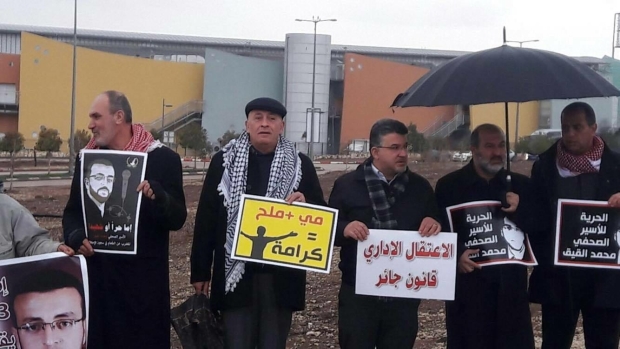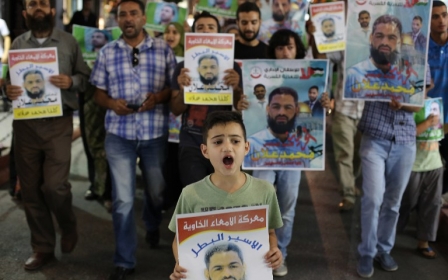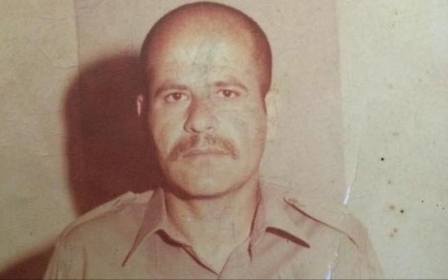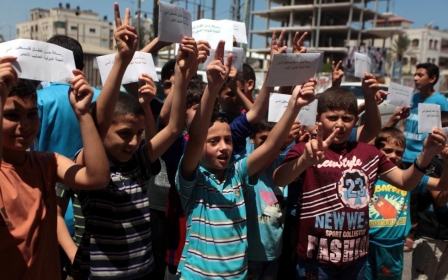Palestinian hunger striker's case to be reviewed by Israeli court
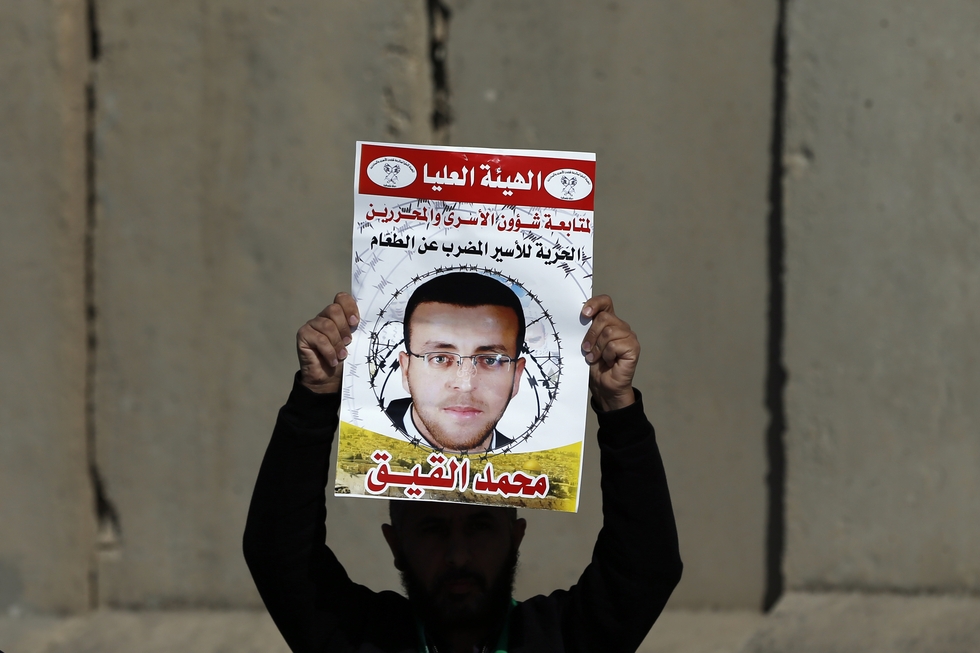
Israel's top court will this week rule on whether to release a hunger-striking Palestinian journalist who is described as being close to death, his lawyer said on Tuesday.
Protesters have picketed an Israeli hospital to call for the release of Mohammed al-Qiq, who has been on hunger strike for 63 days.
Jawad Boulus, Qiq's lawyer, said that the Supreme Court in Jerusalem would rule on Wednesday about whether to release his client.
Israeli authorities arrested Qiq, a journalist from Dura in the occupied West Bank, on 21 November. He began his hunger strike a few days later, and is now in HaEmek hospital in the northern town of Afula.
Tens of journalists and Palestinian members of the Knesset Bassil Ghattas and Haneen Zoabi demonstrated outside under the rain, calling on Israel to release al-Qiq.
“This is our obligation as journalists and as Palestinians to stand in solidarity with a hunger striking prisoner against an unjust system,” said Khuloud Masalha, a journalist with a local media centre.
“He has not been charged with anything,” she continued. “It is clear that he was wanted because of his work as a journalist. He is a prisoner for the freedom of expression.”
“The minimum we could do regarding our profession is to stand with him,” she added.
Member of Knesset Bassil Ghattas reiterated the need to use all kinds of local and international pressure to "save Mohammed al-Qiq’s life".
"We call upon our people, foreign ambassadors and the international community to intervene to pressure Israeli Prime Minister Netanyahu to release al-Qiq," he said.
"Mohammed al-Qiq has only one legitimate demand," Ghattas continued. "Either to be released from custody or to be tried in court."
Qiq’s family, who are denied visits and haven’t seen him since his arrest, said his health had deteriorated rapidly after he lost the ability to talk and was slipping in and out of consciousness.
Israel sentenced the 33-year-old to six months administrative detention on 17 December, a form of internment in which a prisoner is held without charge or trial, with the detention subject to indefinite renewal.
Fayhaa Shalash, al-Qiq’s wife, told Middle East Eye that when her husband was arrested, the Israeli army confiscated some of his belongings before handcuffing and blindfolding him.
“Ever since, I wasn’t able to see him and Israel is still denying me a permit to visit him at Afula hospital,” Shalash said, and appealed to Palestinians within Israel to hold a sit-in outside the Supreme Court and the hospital.
Ashraf Abu Sneina, a lawyer with the Palestinian Authority's Committee for Prisoners' Affairs, told local news agency Maan that Qiq was unconscious and unable to speak, adding that he had exhibited "sudden symptoms that could lead to his death".
A petition by journalists was sent to Palestinian Authority President Mahmoud Abbas on Monday, demanding that he move immediately to secure the release of Qiq, who worked for the Saudi network, Almajd TV.
“We urge for urgent intervention at the highest international levels to press the Israeli government to release him immediately and to allow him to receive the necessary treatment,” the petition said.
“Mohammed al-Qiq’s work was centred on reporting about the suffering of the Palestinian people under occupation, which Israel considered as ‘incitement to violence,'” the text continued. “Saving [Qiq] from imminent death has now become a national duty and responsibility borne by everyone, led by the political leadership.”
In a statement on Monday, Hamas spokesman Husam Badran warned that the movement would “turn the table on the Israeli occupation” if Qiq died.
“We cannot stand by and watch while Israel execute our prisoners,” Badran said, and called on official and popular parties to immediately intervene to secure the release of Qiq.
In a report published on 22 January, Amnesty International called on Israel to stop all punitive measures against al-Qiq.
“The Israeli authorities must immediately cease all non-consensual medical treatment and other punitive measures against Palestinian journalist Muhammed al-Qiq, who has been held without charge or trial for two months and on hunger strike,” Amnesty International said.
Al-Qiq was mistreated and tortured in ways that violated international law, Amnesty added.
According to prisoner rights organisation Addameer, al-Qiq was denied access to his lawyer and interrogated for two weeks by the Israeli Security Agency.
He was subjected to a stress position known as the “banana” for as much as 15 hours a day, where he was tied in a contorted position to a chair, the organisation said. He was also threatened with sexual violence.
Last week, Physicians for Human Rights Israel reported that al-Qiq was hooked up to saltine drips without his consent.
Al-Qiq was “hooked up against his will to an infusion of salts and vitamins, and blood was taken with the permission of the hospital's ethics committee".
The Knesset passed a law on 30 July 2015 that allows prisoners and detainees on hunger strike to be forcibly fed or treated.
The hunger striker was also shackled to his bed, where security officers in and around his room stood guard.
Budour Hassan contributed to this report
New MEE newsletter: Jerusalem Dispatch
Sign up to get the latest insights and analysis on Israel-Palestine, alongside Turkey Unpacked and other MEE newsletters
Middle East Eye delivers independent and unrivalled coverage and analysis of the Middle East, North Africa and beyond. To learn more about republishing this content and the associated fees, please fill out this form. More about MEE can be found here.


